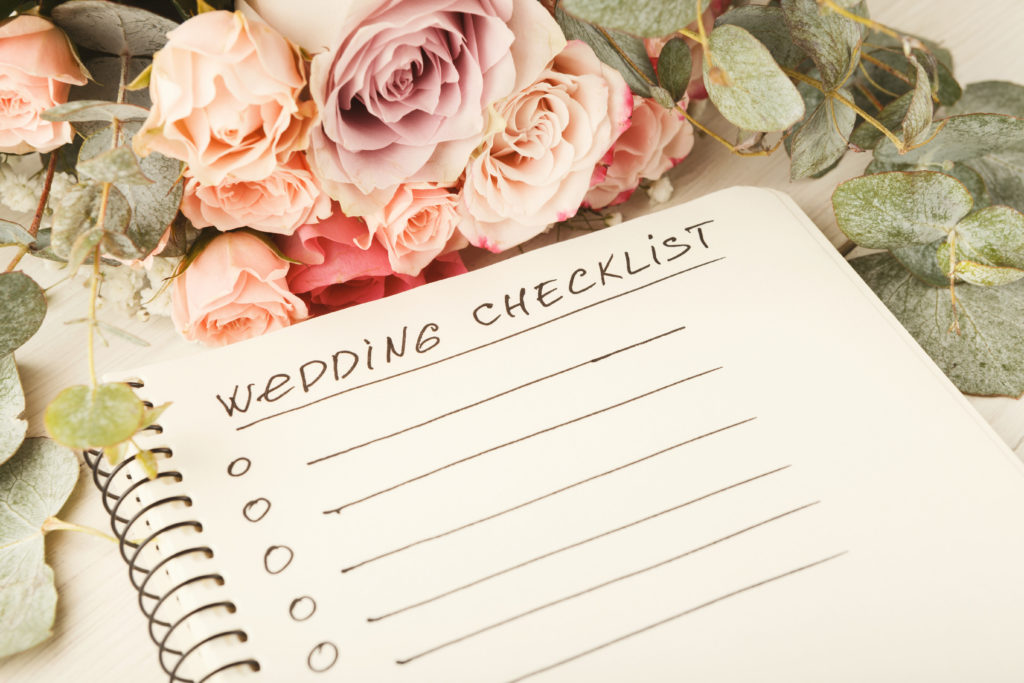“Wedding impossible” is how my marriage ceremony and reception might be labeled today.
Twenty years ago, my now-husband Ted and I planned our wedding in four months. Yes, four. We got engaged in late August and promised “I do” a few days before Christmas. I don’t think we booked our venue until three months before the big day.
Our short planning timeframe isn’t unheard of today, but from what I’m reading on popular wedding websites, it seems unusual — especially in our post-pandemic world. One recent wedding study noted that “the average engagement length was 14 months for couples who didn’t need to postpone their nuptials [due to the pandemic].”
A big reason couples’ engagements average this length is the challenge of booking a venue. Websites such as Brides.com and The Knot advise couples to plan 12-15 months out, with the first task on the list being location, location, location. But what if a couple wants a shorter engagement like Ted and I? Is it even possible to plan the wedding of your dreams so quickly, or will you find yourself getting married in the church parking lot or your mother’s boss’s backyard?
For some couples, the solution to having a short engagement while still getting the wedding of their dreams is to start planning before the “Will you marry me?” question is even popped. A few years ago, a Cosmopolitan article cited a study showing that “60 percent of couples planned part of their wedding before they got engaged.”
Going to the chapel … eventually
Maybe you and the person you’re seriously dating are nailing down wedding details before engagement, or you know a couple who is. You may be nodding your head as you read because you’re well versed in all the latest wedding planning advice.
Some women in serious relationships are planning without their would-be fiancé. They may or may not be booking venues, but either way, their wedding planning binders are more extensive than my master’s prospectus — and they don’t include any ideas or preferences from the man they’re dating.
Many single women plan ahead, too. They may not be dating anyone quite yet, but they have their future wedding planned out in great detail. All they’re waiting for is the groom.
Perhaps one of the above scenarios describes you. If so, let me say that there’s nothing wrong with dreaming about the future or having goals. Proverbs praises “the plans of the diligent” (Proverbs 21:5). If you want to be married someday, it’s not immoral or inappropriate to dream about your future wedding or ponder the details. Marriage is a gift from God, and it’s good to desire it and plan for it. But detailed wedding planning before engagement begs the question: Is it good for your heart?
While Solomon may have applauded the plans of the earnest and hard-working, he also stated that “hope deferred makes the heart sick” (Proverbs 13:12). When there’s no firm commitment, you’re hoping without the actual promise. For couples, you think engagement will happen, but what if it doesn’t? There’s no security for your heart. And if you’re not even dating anyone, too much planning can keep you from fully living in the present of where God has you now.
3 suggestions before you start serious wedding planning
If you’re not engaged but are already signing contracts, I encourage you to hit pause. Consider making these three things your wedding planning non-negotiables.
1. Be engaged
I knew Ted was going to propose before he did — I just didn’t know when. He even showed me examples of engagement rings to see what style I preferred. But we didn’t start planning our wedding until after he asked me to marry him. We wanted to commit first. One reason was to guard each other’s hearts.
I realize that engagement or the promise of marriage doesn’t always mean a couple gets married; Ted had two broken engagements before proposing to me. But that doesn’t negate the importance of the promise that says, “I am publicly making known my intentions to marry you.”
If you’re a couple planning a wedding before getting engaged, let me ask you this: Why are you waiting on the commitment? If it’s to have a shorter engagement, you’re still waiting the same amount of time regardless. If you fear that your relationship can’t stand a long engagement, you may need to either move the date up or reconsider whether you should be getting married.
2. Plan together
I wrote an article on how wedding planning prepares you for marriage. But it can only do that if you plan together. For women planning without the man you’re marrying, you’re missing the opportunity to learn the art of compromise, the finesse of cooperation, and the joy of collaboration. Instead, planning is more of a selfish endeavor that caters to your personal preferences, and it can set the tone for the decision-making process later in your marriage.
When Ted and I started planning our wedding, I was surprised at how he wanted to have a say in all the details. Fortunately, when I met Ted, I hadn’t been planning my wedding for years. Marriage wasn’t even on my radar; I wanted to pursue a career first. But God had other plans for me, and because I didn’t have my mind already set on everything I wanted, we could plan well together. The wedding was about us, not about me.
The secret to our short timeframe was realistic expectations. Whether it was a venue or bakery, we worked with what was available. We remained aware that our wedding day (and ultimately, our marriage) was about far more than a one-day event. Everything didn’t have to be perfect.
3. Trust God with the timing
I was a full-time graduate student who worked a full-time job when Ted and I got engaged. He was also working full-time and occasionally traveling for his job. There were many logistical reasons for us to have a longer engagement and push the wedding back — or to start planning first and then get engaged later. But we didn’t do either of those things. We trusted that God had brought us together, wanted us to be committed in our decisions, and would help us get all the details into place.
We knew we wanted to get married in a church. Fortunately, we lived in a metro area which gave us more options. Since I wanted it to have “character,” we looked at historic churches, contacted a few, and were fortunate to find one available on our date. Because of the short time frame and to save money, we also chose not to hire a caterer. We had a dessert reception where we bought pre-made goodies, and even asked friends to bring their favorite sweets.
As our story shows, fear of not getting a specific venue or missing out on a caterer shouldn’t drive wedding planning. If you’re ready for engagement but logistical concerns are keeping you from committing, take a step of faith. Trust that God will give you wisdom and open up venues and vendors for you.
If finances are delaying your engagement plans — whether it’s your ring budget or how much your dream options will cost — consider adjusting what you plan to spend. A smaller budget doesn’t mean a less unique wedding. A daily part of marriage is managing finances together, and wedding planning is a great place to start learning how to do that.
For those of you wishing engagement were a possibility, but it’s not currently, I understand that it can be hard to trust God’s timing. While I didn’t experience it with engagement and wedding planning, I have in many other areas of my life. God may seem long overdue, and perhaps you’ve been feeling the heartache of hope deferred for a long time. I’m so sorry, friend. I encourage you to ask the Lord to continue to hold your heart in His loving hands as you wait on Him.
Wedding possible
In my wedding site perusal, I came across another article on Brides.com titled, “The 5 Items to Check Off Your To-Do List Before You Get Engaged.” While it does encourage couples to start brainstorming and researching pre-proposal, it also offers what it calls “at least one caveat.” It’s this: “While there are always exceptions, couples should typically avoid signing contracts and making any final decisions until they are actually engaged.” Thank you, Brides.com, for offering some common sense.
With God, there’s no such thing as “wedding impossible.” Ted and I learned this 20 years ago, and I believe God is still showing couples it today as they trust Him with the details.
If you’re finding yourself tempted to plan before the ring, facing the prospect of an engagement that’s shorter than the experts’ “ideal” planning timeframe, or still waiting for God to fulfill your dreams of love and marriage, I invite you to trust Him with the timing and with your heart. He is, after all, the God with whom “all things are possible.”
Copyright 2022 Ashleigh Slater. All rights reserved.












